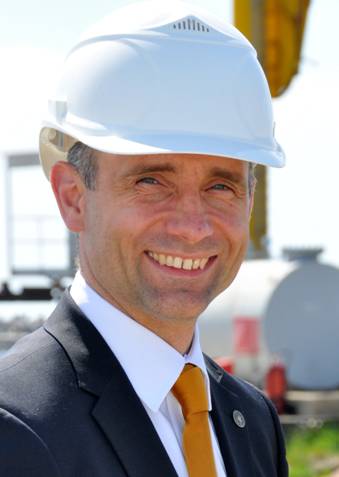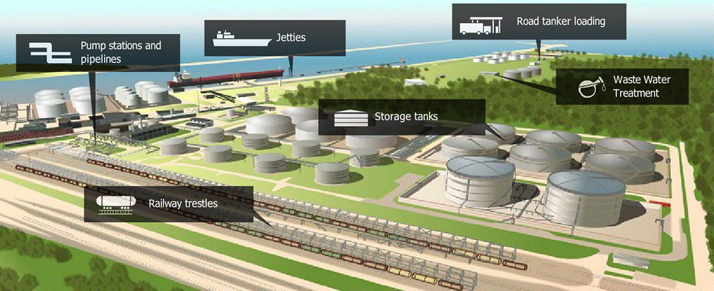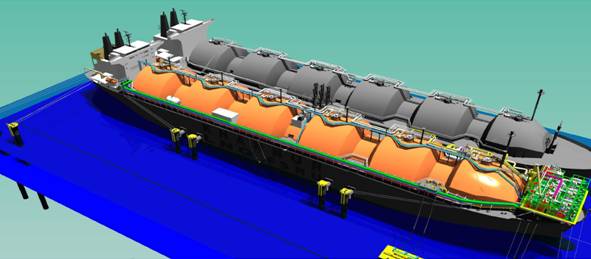
THE VOICE OF INTERNATIONAL LITHUANIA
|
VilNews has its own Google archive! Type a word in the above search box to find any article.
You can also follow us on Facebook. We have two different pages. Click to open and join.
|
Klaipedos Nafta has one of the most up-to-date oil terminals in Europe

Rokas Masiulis, General Manager of Klaipedos Nafta
Rokas Masiulis interviewed by Aage Myhre
aage.myhre@VilNews.com
Rokas Masiulis has huge challenges, both behind and in front of him. As head of the giant oil terminal belonging to Klaipedos Nafta, he has had good success, and has this year also delivered remarkable economic performance for the company that in essence is owned by the Lithuanian State. Now it's planning and development of the increasingly well-publicized LNG terminal that lies in front of him. The president and the government have decided that the LNG venture will be a project of national concern, and as I’m in the process of writing this interview, the President herself is on a visit to Mr. Masiulis to ensure that the planning of the terminal proceeds 'by leaps and bounds'.
In the middle of the storm's eye Lithuania's oil-director still found time to answer my questions. His capacity is compelling...
“From your Klaipedos Nafta web page I have read that your company was founded in 1994, that it was entrusted the functions of reconstruction executive of the oil terminal which had been in operation since 1959 in the Klaipeda Seaport, and that your company became operator of the new terminal when reconstruction of the old terminal started in 1995, a reconstruction that was completed in 2002. The web page also tells that today Klaipedos Nafta is one of the most up-to-date oil terminals in Europe. Anything you would like to add about the company’s history? And please explain to our VilNews readers what the functions of an oil terminal like yours are all about?”
“SC Klaipėdos Nafta is a strategic enterprise of the Republic of Lithuania capable of unloading different oil products from rail tank cars into tankers and, when necessary, from tankers into storage tanks. SC Klaipėdos Nafta transports close to one third of all the cargoes shipped via Klaipėda Port. Our company is well known in handling so called “dark petroleum products” (fuel oil, vacuum gasoil) loading of which require special heating equipment. Our company also serves as a backup route for petroleum products import to the country in case supplies are cut from the east.”
“The Lithuanian State is the major shareholder of Klaipedos Nafta. Who are the other shareholders, and why are they involved?”
“The other shareholders comprise of joint stock companies and private persons, from which the largest is AB Achema, owning more than 9% of AB Klaipedos Nafta shares. The minority shareholders play a role as investors through shares free flow in Nasdaq OMX Vilnius.”
“You claim on your web page that experts from British Petroleum have reported positively about;
a. labour safety,
b. environmental protection
c. fire prevention means
of your Klaipedos Nafta Terminal, every year since 2001. After last year’s catastrophe in the Mexican Gulf, BP’s judgements are probably not that worthy anymore, but what can you in general say about the environmental and fire risks having a an oil terminal of this size located so close to a rather large city centre as Klaipeda is?”
“The Terminal focuses much of its attention on environment protection. Automatic fire detection and extinguishing system, computerized control system of the transshipment process, air, soil and water pollution prevention technologies fully satisfying the European standards have been introduced. Oily waters from the tankers being serviced at the Terminal are collected and treated in the modern mechanical and biological waste water treatment facilities.”
“SC Klaipėdos Nafta also pays great attention to the measures preventing air pollution with hydrocarbons. Vapour, emitted during technological process, recovery and combustion unit has been installed and is in operation where up to 98 per cent of volatile organic compounds, collected from the tanks of the vessels handled at Company’s jetties or from rail tank-cars during their loading, are being burnt. An advanced close discharge system is in operation. During loading – discharging of oil products tank-car hatches are covered with special caps with valves preventing hydrocarbon emissions into the air. Floating roofs, mounted in the storage tanks, reduce product evaporation and thus environment pollution.”

Klaipedos Nafta claims to operate one of the most up-to-date oil terminals in Europe, with the core activity to transship exported oil products from rail tank-cars into tankers, provide Lithuania with imported crude oil and oil products which are shipped to Klaipеda port by tankers.
“Last week you informed the Vilnius Stock Exchange that your profit rose 57 percent in the first half of this year due increased sales and dropped intermediaries. Net income rose to LTL 27.7 million ($ 11.4 million) from LTL 17.6 million for the first half of 2010. These are impressive figures?”
“Yes we can say a great job done through the first half of 2011. Increase of revenues during the first half of 2011 was influenced by significant factors such as successful functioning of the business model - operation without intermediaries, and after termination of a non transparent cooperation with UAB „Naftos grupe“ the Company gained about LTL 5 million (EUR 1,4 million). Additional earnings were achieved by applying increased transhipment tariffs; plus an implemented structural reorganization in the commercial sphere which added LTL 4 million (EUR 1,2 million) earnings from additional services rendered to the clients as well as successful sales in June of oil products recovered from bilge waters that brought LTL 5,7 million (EUR 1,7 million).”
“Your Lithuanian Government and President say they are ready to build a floating LNG (liquefied natural gas) terminal close to the Klaipeda port by 2014 to cut dependence on Russian gas and obtain access to the gas spot market. But I understand that the Latvians and the other Baltic neighbours are not all that convinced and will potentially decline to cooperate on this?”
“This question should be addressed to Lithuania Government and President but the main purpose to build LNG terminal in Lithuania’s security of supply which means we’re thinking of local terminal to cover Lithuania needs.”
“Your Klaipedos Nafta is in charge of the LNG terminal project. Last week you signed an agreement with Fluor Corporation , the largest publicly traded U.S. engineering company, as lead advisor on the planned terminal. You said that they will take over the project's management from July, expected to prepare the technical development plan and assist in selecting technologies, as well as working out a business plan for the terminal. The contract (so far undisclosed) with Fluor covers a period up to 2014, when you expect the terminal to come online. Please tell me more about the size and extent of this contract with Fluor and what they are supposed to accomplish?”
“Our selected lead adviser Fluor will cover financial, environmental, risk&safety, engineering and project management advice, as well as election of main parameters and support in negotiations to acquire FSRU, EPC contract. The LNG supply will be at their responsibility as well. As you see from activities listed above, Fluor will lead us through the whole project implementation period, i.e. 4 years. The contract price with them is EUR 9,229 million (excluding VAT).”
“You’ve also said in an email that Klaipedos Nafta plans the terminal to have a capacity of 2-3 billion cubic meters of gas per year, and that it will cost some EUR 200-300 million to build. Can you elucidate more on these figures? Maybe also exemplify a bit on how many gas tankers (ships) that will represent per year, etc.? And what about the environmental risks, pollution etc. having the LNG terminal located so close to Klaipeda city?”
“The main parameters are so far preliminary, so this is not the time to speculate. In 3-4 months, with Fluor advice, we will determine the main parameters and then we will have a vision of the business plan. Environmental impact assessment will determine any existing environmental risk, pollution and other risks. It is planned to have EIA report ready by the end of 2012. At the first glance it shouldn’t be a negative risk. There are several examples in the world where terminals are located very close to a city, i.e. Barcelona (Enagas).”
“The Government of Lithuania last week gave the projected LNG terminal the status of national importance, and the Cabinet approved the implementation plan, that will provide for speedier procedures of all the institutions involved in the project. This will force other departments to be more active in solving the issues related to land plots, EIA assessment and the involvement of the sea port in the project. The decision came after President Dalia Grybauskaite earlier had criticised the slow pace of the project. Does this represent lack of trust in Klaipedos Nafta’s handling of the project? What else can you say about your cooperation with the Government and the President?”
“We have to do pre-work to enter the more visible movement of the project implementation. I mean, there are lots of procedures and research to be done before engineering and EPC contracting can start, for example. SEIA, development plan, territory planning, marine research, EIA etc. have already been started. We are in close cooperation with the President, Government and other related institutions as we have at hand an ambitious national importance project.”
“How do you see the future for Lithuania’s energy supplies on the backdrop of the above? Do we really need a new nuclear power station, or will the LNG terminal and other sources be sufficient enough for this country by 2020?”
“It’s not our competence to comment on national energy strategy.”
Principle for the planned LNG terminal in Klaipeda


An FSRU (floating storage and re-gasification unit) will be moored to a pier (jetty) and every
arriving LNG carrier will be moored to the FSRU, side by side.
- Bookmark :
- Digg
- del.icio.us
- Stumbleupon
- Redit it
VilNews e-magazine is published in Vilnius, Lithuania. Editor-in-Chief: Mr. Aage Myhre. Inquires to the editors: editor@VilNews.com.
Code of Ethics: See Section 2 – about VilNews. VilNews is not responsible for content on external links/web pages.
HOW TO ADVERTISE IN VILNEWS.
All content is copyrighted © 2011. UAB ‘VilNews’.

 Click on the buttons to open and read each of VilNews' 18 sub-sections
Click on the buttons to open and read each of VilNews' 18 sub-sections 



Exchanges give companies, governments and other groups a platform to sell securities to the investing public. An exchange may be a physical location where traders meet to conduct business or an electronic platform. best cfd trading platform, best cfd platform, best cfd broker, cfd trading platform, online cfd trading, cfd online trading, cfd trading online
A marketplace in which securities, commodities, derivatives and other financial instruments are traded. The core function of an exchange – such as a stock exchange – is to ensure fair and orderly trading, as well as efficient dissemination of price information for any securities trading on that exchange.
[…] Click here to read the article […]
[…] Read the interview… Category : Featured black / Front page […]